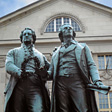SCHILLER RESIDENCE – WEIMAR
House and Museum on Schillerstrasse
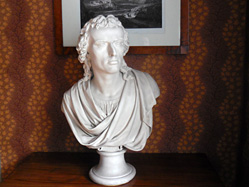 Johann Friedrich von Schiller, perhaps best known today for his play of the Swiss revolutionary hero, William Tell, was a German poet and philosopher, a doctor, historian, and playwright. Weimar is the city he is most associated with and commemorated for his friendship with Johann Goethe with their related work and discussions of art and letters, now referred to as the period of “Weimar Classicism”, which lasted about as long as they lived, and like Goethe, Schiller did not begin life with a “von” in his name.
Johann Friedrich von Schiller, perhaps best known today for his play of the Swiss revolutionary hero, William Tell, was a German poet and philosopher, a doctor, historian, and playwright. Weimar is the city he is most associated with and commemorated for his friendship with Johann Goethe with their related work and discussions of art and letters, now referred to as the period of “Weimar Classicism”, which lasted about as long as they lived, and like Goethe, Schiller did not begin life with a “von” in his name.
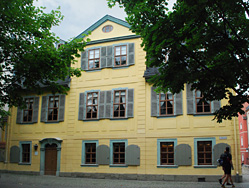 Friedrich Schiller was born in Marbach, Württemberg on in 1759. He was the only son of a military doctor, Johann Kaspar Schiller. He was named after Frederick the Great, but mostly went by Fritz among his friends. In 1766, his father took an assignment with the military guard garrison at Ludwigsburg (see Ludwigsburg Palace). It was here that the young Schiller came to the attention of the Duke of Württemberg, Karl Eugen, who sponsored his entry to the ducal military academy, the Karlsschule in Stuttgart in 1773.
Friedrich Schiller was born in Marbach, Württemberg on in 1759. He was the only son of a military doctor, Johann Kaspar Schiller. He was named after Frederick the Great, but mostly went by Fritz among his friends. In 1766, his father took an assignment with the military guard garrison at Ludwigsburg (see Ludwigsburg Palace). It was here that the young Schiller came to the attention of the Duke of Württemberg, Karl Eugen, who sponsored his entry to the ducal military academy, the Karlsschule in Stuttgart in 1773.
The academy provided a wide ranging education, although the goal of his studies was toward medicine, like his father, and apparently the intention of the Duke. But here Schiller’s love for literature and drama came to the fore. He read Jacques Rousseau, who inspired the English Romantics and Goethe’s Young Werther, and ruminated on the classical ideals with his friends and classmates. He wrote his first play while at the school, The Robbers, which explored the conflict between two aristocratic brothers, suggesting egalitarian leanings.
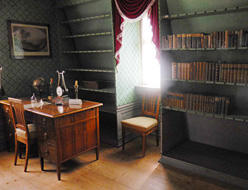 In 1780, he gained a post as regimental doctor, but did not care much for the work, and his connection to drama would create a drama in his own life that would change his course forever. His play was being performed in Mannheim and Schiller left his post without permission. The play was well received but Schiller was arrested and sentenced to two weeks in the stockade. The duke, not particularly pleased with the subject of the play, ordered that he be forbidden from publishing any further works, so the young poet would have to leave Württemberg to pursue his art.
In 1780, he gained a post as regimental doctor, but did not care much for the work, and his connection to drama would create a drama in his own life that would change his course forever. His play was being performed in Mannheim and Schiller left his post without permission. The play was well received but Schiller was arrested and sentenced to two weeks in the stockade. The duke, not particularly pleased with the subject of the play, ordered that he be forbidden from publishing any further works, so the young poet would have to leave Württemberg to pursue his art.
Schiller in Weimar
He departed Stuttgart in 1782, traveling on a wandering journey from Frankfurt, to Leipzig, Dresden, and eventually settling in Weimar in 1787. Along his journey he had an affair with an alluring army officer's wife, Charlotte von Kalb, whom he met in Mannheim in 1784. A writer herself, she was connected in an upper class circle of literary enlightenment friends including Goethe and Johann Herder. He would eventually separate from her, but she is said to the model for a number of his women characters.
Schiller lived in three houses during different periods in Weimar, from 1787 to 1789 he lived in a house (now housing an Italian restaurant) on the Frauenplan just across from the Goethe House. From 1799 to 1802 it was a residence on Windischenstrassee, just around the corner from the current Schiller House and Museum (next to the Shakespeare’s Restaurant) and finally the museum house from 1802 to 1805.
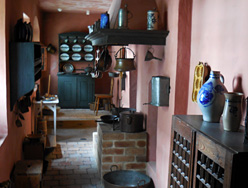 Schiller left Weimar in 1789 for ten years, taking an appointment as professor of History and Philosophy at the University in Jena, where he wrote mostly historical works. He would marry another well connected Charlotte, von Lengefeld in 1790 whom he had met in 1785 in the cultural circle of Weimar and began a romantic correspondence in 1788. He would return to Weimar in 1799 where he rekindled his friendship with Goethe (see Goethe Residence Weimar), who encouraged Schiller to return to playwriting. They founded the Weimar Theater, which became the leading theater in Germany and their discussions of aesthetics led to the concept of Weimar Classicism. Schiller was at his most prolific during his time in Weimar, writing his plays Wallenstein (1799), Mary Stuart (1800), The Maid of Orleans (1801), The Bride of Messina (1803) and William Tell (1804), and working on another.
Schiller left Weimar in 1789 for ten years, taking an appointment as professor of History and Philosophy at the University in Jena, where he wrote mostly historical works. He would marry another well connected Charlotte, von Lengefeld in 1790 whom he had met in 1785 in the cultural circle of Weimar and began a romantic correspondence in 1788. He would return to Weimar in 1799 where he rekindled his friendship with Goethe (see Goethe Residence Weimar), who encouraged Schiller to return to playwriting. They founded the Weimar Theater, which became the leading theater in Germany and their discussions of aesthetics led to the concept of Weimar Classicism. Schiller was at his most prolific during his time in Weimar, writing his plays Wallenstein (1799), Mary Stuart (1800), The Maid of Orleans (1801), The Bride of Messina (1803) and William Tell (1804), and working on another.
For his literary accomplishments, Schiller was knighted in 1802 by another duke, more attuned to the arts, the Duke of Saxe-Weimar-Eisenach, Karl August, adding the "von" to his name. Schiller purchased the large house in the center of town, where today the street in front is named for him, Schillerstrasse. The house, originally built in 1777 was impressive for one of the town’s most prominent citizens, but he had to go into a deep debt to finance it. He would only live in the house for 3 years until his death in 1805, at the age of 45 from tuberculosis. The family would continue to live in the house until Charlotte von Schiller’s death in 1826.
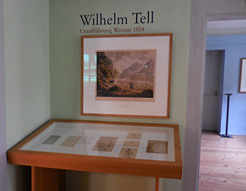 William Tell (Wilhelm Tell) was written by Friedrich Schiller in the upper floor study of the house from 1803 until 1804. The story of a legendary Swiss archer marksman William Tell was an illustration of the greater Swiss struggle for independence from the Habsburg Empire in the early 14th century. Schiller had never been to Switzerland himself, but his wife had, and he was inspired by Goethe, who had been to Lake Lucerne on mulitiple occasions. It would be the last work Schiller completed. The work is commemorated with an interactive display and related exhibits in Schiller’s working study upstairs.
William Tell (Wilhelm Tell) was written by Friedrich Schiller in the upper floor study of the house from 1803 until 1804. The story of a legendary Swiss archer marksman William Tell was an illustration of the greater Swiss struggle for independence from the Habsburg Empire in the early 14th century. Schiller had never been to Switzerland himself, but his wife had, and he was inspired by Goethe, who had been to Lake Lucerne on mulitiple occasions. It would be the last work Schiller completed. The work is commemorated with an interactive display and related exhibits in Schiller’s working study upstairs.
Schiller Historic Residence House
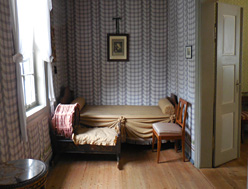 The house presents a view of the atmosphere and living conditions of Schiller’s time in the house, with both authentic items from Schiller’s lifetime and additional furnishings and complimentary decoration of the period. The ground floor encompasses the entrance hall, kitchen and servant’s room, with a coachman’s coat and hat on a nail above the bed, as if he might be needed at a moment’s notice. A multimedia screen documents the history of the house and gives an insight into everyday life in the Schiller household.
The house presents a view of the atmosphere and living conditions of Schiller’s time in the house, with both authentic items from Schiller’s lifetime and additional furnishings and complimentary decoration of the period. The ground floor encompasses the entrance hall, kitchen and servant’s room, with a coachman’s coat and hat on a nail above the bed, as if he might be needed at a moment’s notice. A multimedia screen documents the history of the house and gives an insight into everyday life in the Schiller household.
The first floor combines the living room, bedroom and dressing room for Schiller’s wife and smaller sleeping chambers of their children, with bed and nursery bassinette. The most prominent authentic items in these rooms include Thuringian porcelain coffee pot, given by their mother-in-law as a wedding present, with cups, a tea machine and some champagne glasses. Small drawings by Schiller’s children are on display in the nursery.
Schiller kept his work space separate from the family in the upper floor, with his working desk and library, and his sleeping arrangement, so he could work undisturbed. Here you’ll find a copy of the most famous portrait of Schiller by Anton Graff, with the walls in the adjoining salon hung with art which belonged to Schiller. The study is most authentic room in the house with most of the furnishings originals. One of the more impressive objects is the striking bust of Schiller sculpted by Johann Heinrich Dannecker..
Schiller Museum
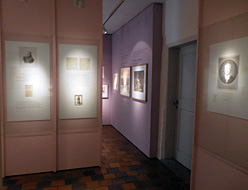 The residence entrance is through the Schiller Museum, situated in a connected building on the north side of the historic house. The Schiller Museum has three exhibition rooms. The room connected to the house presents art, images and documents related to Schiller’s story with the current exhibit “Schiller in Thuringia” covering the poet’s life and work in Bauerbach, Rudolstadt, Jena and Weimar.
The residence entrance is through the Schiller Museum, situated in a connected building on the north side of the historic house. The Schiller Museum has three exhibition rooms. The room connected to the house presents art, images and documents related to Schiller’s story with the current exhibit “Schiller in Thuringia” covering the poet’s life and work in Bauerbach, Rudolstadt, Jena and Weimar.
Built in 1988 with modern architecture of glass, the Schiller Museum is one of the few new museums to be built during the GDR East German regime. The museum offers temporary exhibitions as well as Schiller.
Visiting the Schiller Residence Weimar
Open hours for the Schiller House are 9:30 am to 6 pm Tuesday through Sunday (closed Monday) from the end of March through October, and 9:30 to 4 pm November to March. Admission for adults is €8, Discount Concession €6.50, Students (16-20 years) €3, under 16 years free. There is an audioguide available in multiple languages. © Bargain Travel Europe
Find best hotel and vacation deals in Weimar on TripAdvisor
These articles are copyrighted and the sole property of Bargain Travel Europe and WLPV, LLC. and may not be copied or reprinted without permission.
See Also:
BACH HOUSE MUSIC MUSEUM - EISENACH
BAUHAUS & MASTER HOUSES - DESSAU

